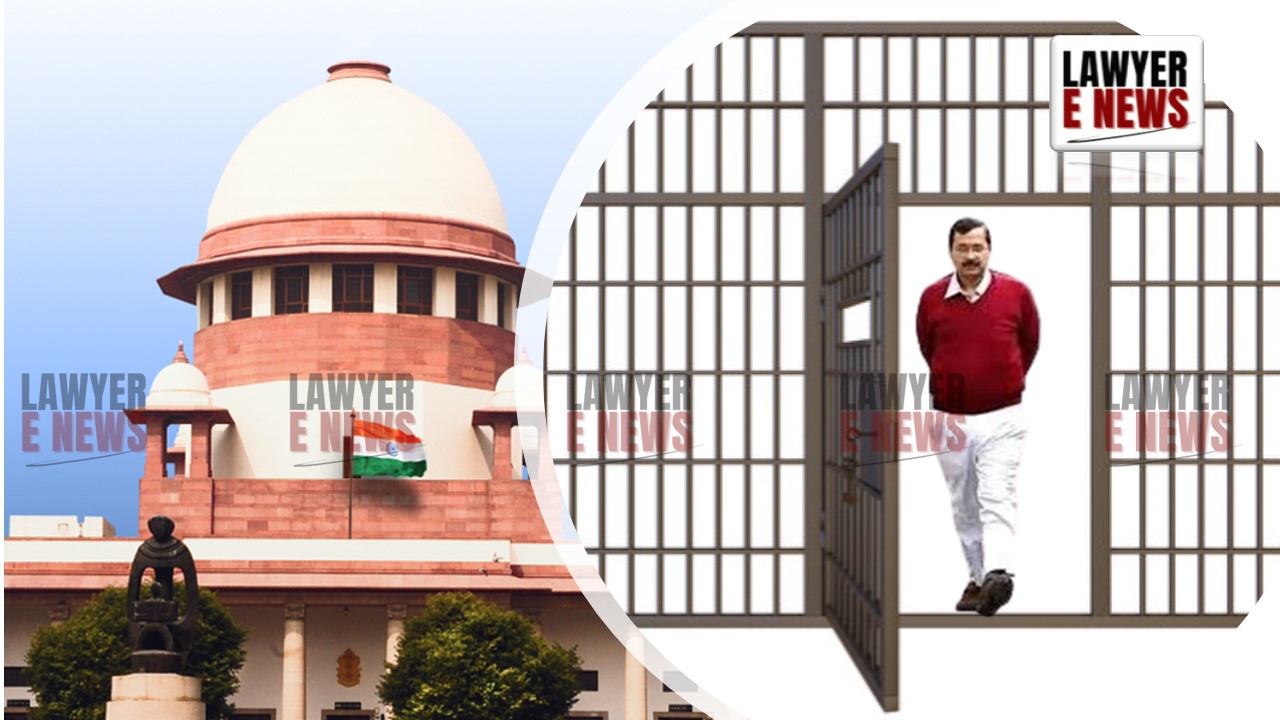-
by Admin
15 February 2026 5:35 AM



"Compliance with Section 41A is not merely procedural but must be balanced with necessity." Today, On September 13, 2024, the Supreme Court of India granted bail to Arvind Kejriwal, overturning the Delhi High Court’s order denying him bail in the ongoing CBI investigation into the 2021-2022 Delhi Excise Policy. Despite ruling that the procedural aspects of his arrest were in accordance with the law, the court criticized the arrest as unnecessary, given that Kejriwal had complied with prior summons and the investigative agencies had already gathered the relevant evidence. The court held that his prolonged incarceration violated his fundamental rights under Article 21 of the Constitution, ordering his release on stringent conditions.
Arvind Kejriwal, three-time Chief Minister of Delhi and leader of the Aam Aadmi Party, became embroiled in a scandal concerning irregularities in Delhi's 2021-2022 Excise Policy. The CBI registered an FIR on August 17, 2022, under charges of conspiracy (Section 120B IPC), falsification (Section 477A IPC), and corruption under the Prevention of Corruption Act, 1988. Kejriwal’s arrest on June 26, 2024, came after months of investigation, following the Directorate of Enforcement’s (ED) arrest in March 2024 under the Prevention of Money Laundering Act (PMLA). Despite these developments, Kejriwal was not initially named in the CBI’s charge sheets, which targeted other officials.
As part of the CBI’s case, allegations arose that the accused manipulated the excise policy to benefit liquor wholesalers, leading to significant financial gains for private entities, with proceeds allegedly being used to fund political activities, including the AAP's election campaign in Goa.
After his arrest, Kejriwal applied for bail, first in the trial court and then in the Delhi High Court, both of which denied relief, leading to his appeal to the Supreme Court.
The legality of the arrest: Was Kejriwal's arrest compliant with Section 41A of the Code of Criminal Procedure (CrPC), which requires the issuance of a notice for appearance instead of an arrest when the accused is cooperating?
Entitlement to bail: Did Kejriwal meet the conditions for release on bail, considering the seriousness of the allegations, the complexity of the evidence, and the principle of personal liberty under Article 21 of the Constitution?
The Supreme Court’s judgment, delivered by Justice Surya Kant, delved into the legalities of the arrest. While acknowledging that the CBI followed the proper procedure by seeking permission for arrest under Section 41A of the CrPC, the court found that the arrest lacked substantive necessity. The CBI had already interrogated Kejriwal, and all evidence, including financial records and witness statements, had been collected. The court remarked, “Compliance with Section 41A is not merely procedural but must be balanced with necessity. Arrests cannot be mechanical when cooperation with investigations is evident.”
The court noted that Kejriwal’s name was only added to the CBI’s final charge sheet on July 29, 2024, almost a month after his arrest, and raised concerns about the timing. It held that, in such cases, the power to arrest must be exercised sparingly and only when absolutely necessary for further investigation.
The bench highlighted the principle of personal liberty under Article 21 of the Constitution, noting that prolonged detention without sufficient cause violates fundamental rights. The court emphasized that the filing of multiple charge sheets and the complex nature of the case were not reasons to deny bail indefinitely, particularly when the trial could take months, if not years, to conclude. "The prolonged detention violates the sacrosanct right to liberty under Article 21 of the Constitution," the judgment stated, stressing that Kejriwal’s continued imprisonment could not be justified simply on the basis of serious charges.
The court underscored that bail should not be withheld based on unfounded fears of flight risk or evidence tampering, especially when Kejriwal had no prior criminal record. The judgment cited the "triple test" for bail, stating that the accused posed no risk of absconding, had no criminal antecedents, and there was no concrete evidence that he would interfere with the ongoing investigation. The court imposed conditions for bail, including a bond of ₹10 lakh, no public discussion of the case, and cooperation with the trial court.
In a concurring but separate opinion, Justice Ujjal Bhuyan expressed concern about the timing of Kejriwal’s arrest. The CBI had not sought his arrest for nearly two years after the FIR was filed. Justice Bhuyan questioned why the arrest was made only after Kejriwal received bail in the ED case, suggesting that the CBI’s actions appeared to be an attempt to frustrate the bail order in the PMLA case. "The timing of the arrest raises more questions than it answers," Justice Bhuyan remarked, adding that evasive answers during interrogation were not sufficient grounds for arrest.
The Supreme Court granted Kejriwal bail, acknowledging that while the CBI followed procedural requirements, the arrest itself was unnecessary and violated the principle of liberty enshrined in Article 21. The court allowed his release on bail, subject to stringent conditions, and directed the trial court to expedite the proceedings without any undue delay. This ruling emphasized the balance between law enforcement’s powers and the constitutional rights of individuals, setting a benchmark for future cases involving the arrest of high-profile individuals.
Date of Decision: September 13, 2024
Arvind Kejriwal vs Central Bureau of Investigation
